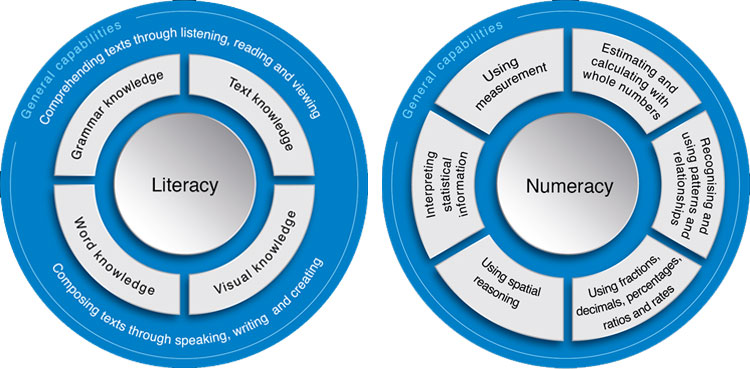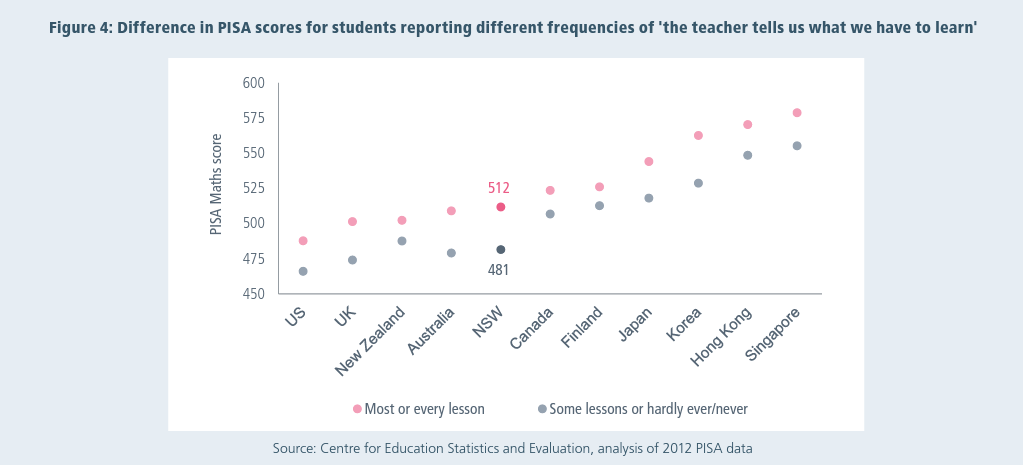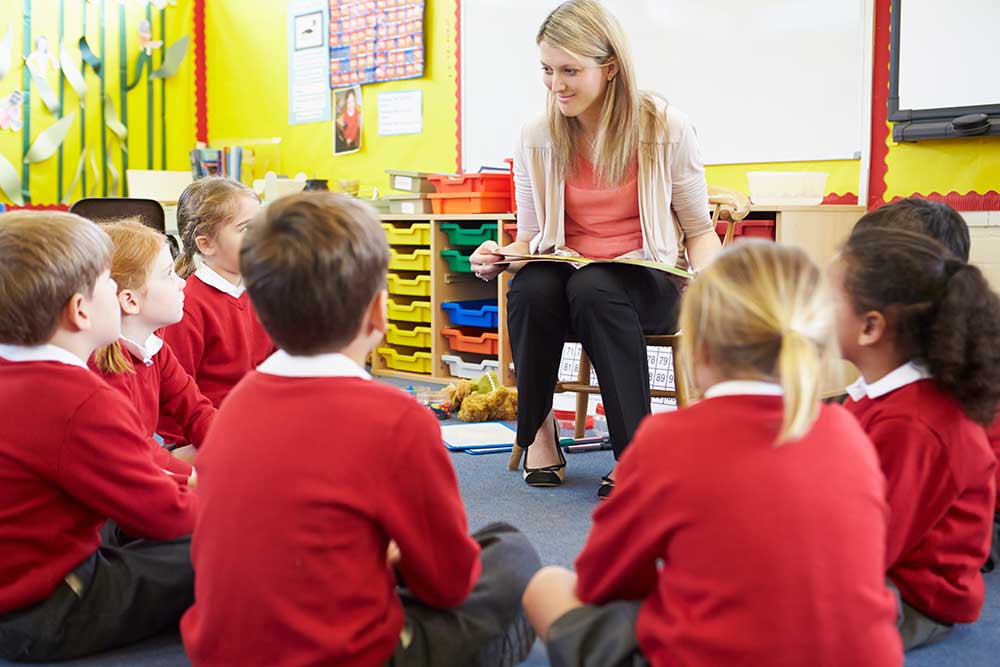5 ways to improve literacy and numeracy at your school

As an educator, you know how important literacy and numeracy are for your students’ learning. They’re the bedrock of every other skill; the basic capabilities students need to advance and succeed.
But regrettably, NAPLAN results from 2023 show that many Australian children aren’t measuring up in literacy and numeracy. A third of them failed to meet the more rigorous benchmarks that were introduced in this year’s test,1 a number that is even higher for Aboriginal and Torres Strait Islanders as well as students living in remote areas.2
Many of your students may need additional support to improve their literacy and numeracy skills, and in this article, we offer some strategies on how to do so. Many of these are based on my personal experiences as a teacher, in addition to some official evidence-based recommendations from the NSW Government.
How to improve literacy and numeracy at your school
“Adolescents entering the adult world in the 21st century will read and write more than at any other time in human history. They will need advanced levels of literacy to perform their jobs, run their households, act as citizens, and conduct their personal lives.”
– Richard Vacca, Content Area Reading: Literacy and Learning Across the Curriculum
1. Ensure your teachers are testing regularly
Your teachers subconsciously assess their students’ literacy and numeracy skills every day, just by observing and interacting with them. But for a more objective verdict, you’ll need to ensure they are setting regular formative/diagnostic tests. Variation is important too – teachers with a wide repertoire of teaching practices tend to do best,3 which includes assessment types suited to each unique scenario and skill. Some diagnostic assessments can even help students become self-learners.
These assessments will help your teachers understand progress in literacy and numeracy for the class as a whole, as well as for individual students. They’ll know which general capabilities (see below) their students may need to brush up on and have a clear direction on how to reduce the performance differences for their class, which can be spread across as many as eight year levels. As such, formative assessments act as signposts for your teachers, directing them to the content and activities that are needed to slowly build their students’ literacy and numeracy skills.
 Image from the Australian Curriculum
Image from the Australian Curriculum
In addition to everyday diagnostic assessments, your teachers can develop an even stronger understanding of their students’ literacy and numeracy skills through annual progression testing, which gives them a clear-cut view of student progress from one year to the next (we’re running a University of Sydney sponsored program that provides free progression testing to select schools in NSW, if you’d like to learn more). Well-made assessments should also break down students’ individual skills – writer’s craft, vocabulary, number & arithmetic etc. – allowing your teachers to see exactly what needs to be improved.
We know your teachers are already short on time, but the more useful assessment data they have for their students, the better they will be at spotting gaps in their literacy and numeracy skills. If they spend the time analysing the data, and have the skills to do so, their vision will be sharper and they’ll be able to make evidence-based decisions on how to improve these key foundational skills.
2. More support for Years 1, 2 and 3
“Studies show that if children are missing adequate reading skills by the end of Year 1, without intervention, they almost never surpass average reading skills by the end of primary school.”3
Every year of a child’s education is important, but especially so when they are younger.
In Australian schools, years 1, 2 and 3 (as well as kindergarten and before) are when children develop the fundamental literacy and numeracy skills that allow them to understand more complex concepts. They are the building blocks of their entire education – not just for literacy and numeracy, but every single topic. Without them, their learning is stunted.
Studies show that if children are missing adequate reading skills by the end of Year 1, without intervention, they almost never surpass average reading skills by the end of primary school.3 It’s a similar story with understanding numbers – a lack of understanding at the end of Year 1 is a severe hindrance to future learning.3
So, it’s vital to support your Year 1, 2 and 3 teachers. You can try to:
- Upskill teachers on how to teach phonics, textual concepts within texts, and improving reading fluency for these students. There is a huge shift to these concepts in the new syllabus, and being able to teach them effectively is key.
- Move some budget around to provide them with extra hands and resources – consider it an investment in your school’s future performance.
- Give them lots of opportunities to air their concerns, and work together to overcome them. Be their champion!
- Leave some teacher planning days empty – don’t fill them with tasks. They can be invaluable for catching up.
- Monitor their sick leave and provide them with mental health days if they need them. This can also be an opportunity to offer support on how to reduce their stress-levels.
(Note: these can be excellent ways to help teachers for every year level).
 To succeed later on, students need to grasp literacy and numeracy in their earliest school years
To succeed later on, students need to grasp literacy and numeracy in their earliest school years
If your youngest students nail the fundamentals of literacy and numeracy, they are on an excellent trajectory for their remaining education. Try to provide tonnes of support for their teachers.
3. Create an ironclad professional development program
This is an obvious one, but worth mentioning. Your school’s education is only as good as the knowledge and skill of its teachers, so try to forge a high-quality professional development program with an emphasis on literacy and numeracy.
Your teachers may groan at the prospect of training days, particularly when they look at their jam-packed calendar. But the better they are at understanding and teaching literacy and numeracy, the faster their students will grow in every area, and the less support they’ll need down the line. It’s long-term rather than short-term thinking. Research shows that the best teachers of literacy have a strong knowledge of literacy,3 and we can draw the same conclusion for teaching mathematics.
In addition to focusing on literacy and numeracy – from the fundamentals through to the advanced – a great program may include:
- Helping teachers develop a strong understanding of curriculum content and the best ways to teach it.
- Clear goals and deliverables for completed training. It must always have an evident, practical use.
- Listening to teachers on what they need from your professional development program and incorporating their ideas.
- Identifying each teacher’s strongest skills and encouraging them to help their peers.
- Experienced mentors running classes and helping teachers where they can.
- Unique professional development plans for every teacher, which are seen through to the end.
- Learning how to address common classroom challenges.
- Learning how to provide explicit instructions to students (see diagram below).
- Conferences, seminars, workshops etc. These can be more engaging than regular training days and give your teachers the chance to blow off a little steam. They also contribute to their mandatory hours for professional development.
While literacy and numeracy training is key, they shouldn’t come at the expense of other important skills like setting the right assessments (including analysing results data), communicating with students well, organising a busy term schedule, and many more. Ideally, your professional development program should tackle all of these, rounding out your teachers’ skills and helping them to become mighty educators. Easy in theory, tough in practice. But oh so worth it.
 Image from “How schools can improve literacy and numeracy performance and why it (still) matters)”3
Image from “How schools can improve literacy and numeracy performance and why it (still) matters)”3
4. Implement a response to intervention program for struggling students
Response to intervention (RTI) is a technique that allows teachers to identify students who are falling behind, and then provide targeted teaching to help them catch up.
Teachers will likely already know which students are having difficulties, but with this method, they would first validate these beliefs with an assessment. Once confirmed, they can ask the students to work on the problematic content together in small groups, giving them the chance to support each other. Or if necessary, the teacher or their support staff can complete one-on-one instruction. Once a reasonable amount of instruction has occurred, they can re-assess to determine whether the intervention is working.
To the students involved, these kinds of interventions should feel like a regular part of everyday class – not a “problem” that the student has. Your teachers are just giving them a little extra help to grow.
Creating a formal structure and procedure for RTI programs can give your teachers the confidence they need to get started.
5. Create a literacy and numeracy culture
 Group reading can spark a passion for books
Group reading can spark a passion for books
“Evidence suggests that children who read for enjoyment every day not only perform better in reading tests than those who don’t, but also develop a broader vocabulary, increased general knowledge and a better understanding of other cultures.”
– Pearson4
Literacy and numeracy permeates so much in our lives – the stories we tell, how we communicate, why airplanes can get off the ground, the internet, and countless other examples that make our lives worthwhile. So, the skills should be treated with the reverence they deserve, and one way to do so is by creating a literacy and numeracy culture at your school.
There are lots of ways to do this, but some good methods include:
- Teach the importance of reading for leisure – children who enjoy reading are stronger writers, better communicators, and have a clearer understanding of other cultures. It may even be a better predictor of school success than a child’s economic background (Pearson 2015). Ensure your teachers are communicating these valuable benefits to students.
- Teach the importance of numeracy for our modern economy – our age is a digital one, with a huge portion of the global economy coming from STEM-based industries. Many of today’s students will pursue technology careers, which can be lucrative and highly satisfying for the mathematically-minded. They need to learn about this from their teachers. You might even consider inviting tech professionals to give talks.
- Create book clubs – stories can be inspiring, mesmerising, provoking, and everything in-between. And when they move us in these ways, we may find ourselves wanting to talk about them with others. Book clubs are perfect for this. They’ll give your students the chance to chat about their thoughts and feelings around the books they’re reading, get lots of juicy recommendations, and improve their literacy skills all the while.
- Create maths clubs – similarly to the above, maths clubs give students the opportunity to solve maths problems for fun. It helps to stimulate their mathematical curiosity, improve their teamwork abilities, and most importantly, boosts their numeracy skills.
- Host spelling and maths competitions – students who excel at spelling or maths may seize the opportunity to compete against their peers, and cherish being celebrated by their teachers and classmates. Give them a platform to do so! ICAS has renowned academic competitions for Spelling Bee, English, Writing and Mathematics.
- Build a strong library – this one takes time and money, but a library filled with quality books (both fiction and non-fiction) is an invaluable resource for students, and an excellent way to build a strong literacy and numeracy culture at your school. And if you make students ultra-comfortable by filling it with colourful bean bags and cushions, with plenty of inspirational quotes on the benefits of reading, they’re more likely to enjoy spending time there.
- Post reading lists – to build enthusiasm for reading, your teachers might consider posting lists outside classroom with three columns: what I’m reading, what I want to read and what I recommend. Students can fill these in and learn which books their classmates are into, sparking conversation and building excitement and passions for reading.
Improving literacy and numeracy at your school is a big task, but may be one of the best ways to boost students’ performance for every subject. I hope this article has given you some good ideas for doing so.
If you would like to learn about our free student progression testing program for select NSW schools (which can help your teachers improve literacy and numeracy for their students), you can learn more here: Data-led Education Equity Program (DEEP).
References
- Robyn Grace, Nicole Precel, 2023, One third of Australian students fail to meet new NAPLAN benchmarks, The Age
- Jordana Hunter, Nick Parkinson, 2023, NAPLAN benchmarks have changed, but bad results stay the same, Financial Review
- 2016, How schools can improve literacy and numeracy performance and why it (still) matters, NSW Government
- Enjoy reading, Pearson
Nardin is a former primary school teacher of 10 years. During her time as a teacher, she served as Head of Years for K-2, was a trained NAPLAN marker, and was part of the team that wrote the 2021 NSW English Syllabus 3-6. She is currently an assessment consultant for ICAS and Reach.
 Written by Nardin Hanna
Written by Nardin Hanna

